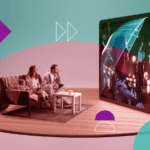A Q&A With Amanda Williams, Senior Director, Client Experience & Integrated Strategy, Parallel Path, Boulder, CO
By R. Larsson, Advertising Week
In the women’s health landscape, the menopause market is a blind spot. Menopause is not just another life stage; it is a profound transition marked by physical shifts, emotional complexities, and neglected wellness needs. Why does this matter now more than ever? Generation X and Millennial women are reaching this milestone with a collective sense of frustration and confusion. They’re questioning why menopause – a natural journey affecting millions – has been sidelined in discussions, solutions, and support.
Beyond its biological implications, menopause represents an opportunity for brands to redefine women’s health and wellness strategies. Women navigating menopause seek more than just symptom relief; they desire products, services, and brands that enhance their overall quality of life.
We spoke with Amanda Williams of Parallel Path, Boulder, an agency specializing in the health and wellness market about how companies can ease women’s menopause journeys by using empathy and dignity to guide their marketing approach.
Q: We read some recent market analyses that project the menopause market to surge to $22.7 billion by 2028, driven by increasing awareness of menopause as a critical health phase and a demand for better solutions. Does that align with what you’re seeing as well?
Amanda Williams: Yes. Millennials, comprising over 30 million women in the U.S. alone, are entering perimenopause stages, and they’re bringing with them a tech-savvy and proactive approach to managing their health. Similarly, Gen X women, known for their independence and focus on wellness, are taking an active stand in shaping their menopause journey, seeking holistic solutions that align with their lifestyle and values.
And yet a 2023 report by the Institute of Practitioners of Advertising found just 7% of women aged 49-64 felt that brands and retailers are doing an adequate job catering to them at this stage of life. The report also noted that two-fifths of women think that the advertising targeted at their stage of life is unreflective of their life or that of their friends, uninspiring, outdated, and not relatable.
Q: Given that doomy assessment, what do you think are the most important things brands in the female health category need to improve?
AW: I’d start with using more empathy-driven marketing. Menopause transcends biology; it’s a transformative experience that requires empathy and understanding. Brands that authentically connect with menopausal consumers through storytelling and inclusive messaging build deeper, more meaningful relationships. Also, education could be an area for brands to lean in. Beyond just medical facts, there’s a pressing need for broader education about menopause across the wellness spectrum. Brands can lead the charge by debunking myths, fostering open conversations, and promoting menopause as a natural and empowering life stage.
Q: Is one of the reasons for the ‘menopause market is a blind spot’ because there are not enough women in leadership roles at these brands?
AW: Menopause in general hasn’t gotten enough attention in the past largely because it wasn’t, and still isn’t studied or funded enough. Because there’s a lack of information in the medical community, it’s also not well taught in medical school, doctors are getting less than four hours of training on this critical life stage. It’s also historically been a taboo subject for both men and women. Part off the reason the menopause market is finally having a day of reckoning is because more women, across multiple generations, are speaking out, because more female doctors are willingly and interested in increasing their knowledge base as they too go through this life stage and want to ensure better care and education for their patients. Most, but not all, of the brands in this space do have a majority of female leadership. Unfortunately what there isn’t enough of are men – in general or as part of the medical community – who are willing and interested in learning more about this subject and being curious about how to better support or help the women in their lives. So, the ‘boom’ in this space is because more women are taking the reins, celebrities are funding research and investing in brands and more women are getting the word out and making it known that we don’t have to suffer in silence.
Q: What’s the biggest challenge you see brands in the category facing in 2025? How should they overcome those challenges?
AW: A continued focus on creating awareness around the topic is critical. We need greater awareness that there are products and services to help support women and decrease symptoms and that HRT can be a great option for many, many women. Women can search and find menopause-certified practitioners in their area by visiting the National Menopause Society website. Mostly, brands need shelf space in places where women shop, like Ulta, Target, grocery stores, etc., with educational instore signage. Brands also to show up digitally where their target already is, for example Meta for Gen X, TikTok for Millennials, etcetera.
Q: How about social media influencers and similar branding partnerships?
AW: Partnerships with healthcare providers, influencers, and menopause advocacy groups amplify brand credibility and impact. We’ve also seen that collaborative efforts in research, education campaigns, and policy advocacy can drive systemic improvements. I’d also add that telemedicine, mobile apps, and online communities are reshaping how menopausal women access information and support and smart brands should be leveraging these digital platforms to offer personalized, easy-to-access solutions as well.
Q: So what brands do you think are getting it right in this area?
AW: The market is also witnessing the emergence of specialized apps and wearables that are opening up new avenues for managing symptoms and holistic health. I love what actress Naomi Watts is doing with her brand Stripes, which champions a pro-aging mindset and sells clinically proven products ranging from skincare, hair and body care, vaginal wellness, and supplements. I also love the tailored quizzes they offer that let women evaluate their symptoms to find the most effective solutions on their own.
I love the specificity of Better Not Younger, which addresses how hair growth slows and strands weaken during menopause and has a range of science-backed products designed to help maintain hair health as women age. Last, a good example of education and brand partnerships is Midday, an app designed to support women through the challenges of menopause and midlife health. The app tracks symptoms, provides expert advice, and even allows users to schedule appointments with Mayo Clinic specialists.
Q: Any final thoughts?
AW: The menopause market represents more than a demographic; it’s a catalyst for redefining women’s health and wellness. The bottom line: there’s a significant gap in holistic wellness offerings tailored explicitly to menopausal women, and brands that are poised to address this gap with consumer-centric strategies stand to not only capture market share but also foster enduring customer loyalty.








